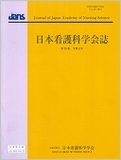Japanese
English
- 販売していません
- Abstract 文献概要
- 参考文献 Reference
要旨
目的:救急外来での終末期患者の家族ケアに対する看護管理者の評価および組織体制の実態とその関連について明らかとすることを目的とする.
方法:救急外来の看護管理者を対象に質問紙調査を実施した.救急外来での終末期患者の家族ケア30項目を使用,因子分析から評価得点を作成し,組織体制との重回帰分析を行った.
結果:有効回答は149名(51.6%)であった.救急外来での終末期患者の家族ケア30項目に対する肯定的な評価の割合は53.3〜96.6%であった.重回帰分析の結果,合計得点と「救急外来での年間死亡患者数」(β = -0.21),「多職種連携体制あり」(β = 0.25),「ケアの評価あり」(β = 0.44),「標準化されたケアプラン・マニュアルあり」(β = 0.24)で関連を認めた.
結論:看護管理者が十分に実践されていないと認識しているケアの存在が明らかとされ,実践の促進には多職種連携体制やケアの評価・標準化に関する組織体制整備が必要であることが示唆された.
Objective: This study aimed to have nurse managers in emergency rooms evaluate the care provided for families of terminally ill patients and identify systemic organizational factors related to that care.
Methods: A 30-item survey on the care provided to families of terminally ill patients was conducted among nurse managers working in emergency room. Factor analysis was used to score the responses, and regression analysis was performed on factors related to how the organization systematically provided the care.
Results: Valid responses were received from 149 (51.6%) of the targeted sample participants. The range of the percentage of positive ratings on the 30 items was 53.3-96.6%. Regression analysis showed that the systemic factors significantly predictive of total scores were “annual number of patient mortalities in the emergency room” (β = -0.21), “systematic multi-disciplinary collaboration” (β = 0.25), “systematic evaluation of care” (β = 0.44), and “existence of a standardized care plan manual” (β = 0.24).
Conclusion: This study showed that nurse managers perceived that, in some cases, more needs to be done in the way of care for the families of terminally ill patients. The findings also suggested that to promote better practice, health organizations need to have in place systems for multidisciplinary collaboration and for the standardization and evaluation of care.
Copyright © 2019, Japan Academy of Nursing Science. All rights reserved.


